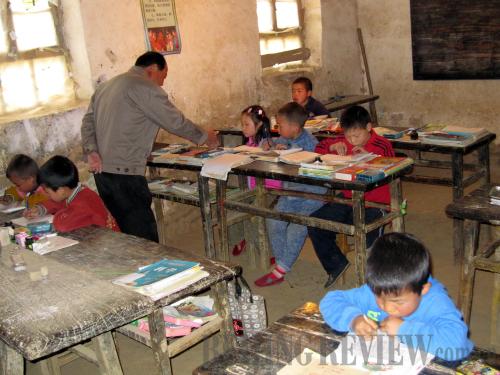|
 |
|
UNATTENDED: All students at Yaopo Primary School in mountainous Shangluo, Shaanxi Province, live apart from their parents working in cities. A lack of parental care is the biggest problem facing children who have been left behind in rural areas (DING XIULING) |
Fraudulent Wage Raises
After Taiwan-funded electronics manufacturer Foxconn announced in May it was raising workers' average monthly wages from 1,200 yuan ($176) to 2,000 yuan ($294), there were reports wage rises were becoming common in the Pearl River Delta region, one of China's biggest manufacturing bases.
But wages are actually dropping instead of rising. Some companies in the region require their employees to do more work in a shorter time and are cutting various subsidies for employees.
These companies promised to raise employees' wages following widespread criticism of being sweat factories, but once the pressure of public opinion begins to decrease, cold bloodedness shows up again.
To realize decent working conditions for ordinary workers becomes an urgent expectation, especially after a string of suicides at Foxconn in the first six months of this year. Ensuring that workers will receive reasonable payments is undoubtedly the key.
Qilu Evening News
Inaccessible Subsidies
Entering July, a heat wave swept across most of China. In some regions, the temperature exceeded 40 degrees Celsius.
Days of high temperatures have rekindled the topic of high-temperature subsidies and vacations. It has been announced company workers on guard in Shaanxi Province will be given 2 yuan ($0.3) per day as a subsidy.
For most workers, even that small sum is not easy to get. If employers play a small trick or the labor authorities do not watch closely, the subsidy will be out of the reach of workers. On construction sites and in small private companies in Xi'an, capital of Shaanxi, no subsidy has been given at all.
China's only legal regulation on high-temperature operations was issued in 1960, an interim regulation set down to apply for only 50 years. Besides, the regulation only focuses on a small number of industries such as metallurgy.
Generally, migrant workers are paid based on how many days they work. Even if they are allowed to have one or two days' leave because of high temperatures, most of the workers say they will give it up, because that will cut into their incomes.
How to improve the welfare of those working in high temperatures is an urgent work facing government.
The Beijing News
Education Inequality
A survey by education data company MyCos HR Digital Information Co. Ltd. shows the majority of children of migrant workers and those from rural and ordinary urban working families are enrolled in vocational and technical schools and junior colleges, while children whose parents are in better paid are more likely to study in prestigious universities.
Figures from MyCos showed among the 2009 graduates, only 38 percent were from rural or migrant workers' families.
The phenomenon that students from rural areas are mostly enrolled in vocational schools and junior colleges is noticeable.
There are several reasons for this. Primary and secondary education in rural areas is underdeveloped, and children there only receive a mediocre education compared with peers in urban areas. Children in cities can choose to attend various cram classes, while high tuition fees drive away those from poor families.
From 2003 on, some prestigious universities have been allowed to enroll students independently from the national college entrance exam. They use an "exam plus interview" method, which poses a big problem for children from rural areas as they cannot afford transportation to interview sites. Worse still, for those who do make it, because of a lack of communication skills, many of them are not able to pass the interview section.
In order to reverse this unequal situation, the government should take on responsibility for providing equal education opportunities for students in or from rural areas.
The institutions of higher learning should favor students from poor families as their opportunities to receive higher education are far less than those from well-off families.
Oriental Morning Post
Lonely Children
On July 3, five primary school students in Shaanxi Province's Xinlin Town gathered together in a dilapidated temple and tried to kill themselves by drinking pesticide. They were lucky to be found by passers-by and taken to hospital. The five children rejected explaining their suicide attempt after their lives were saved.
What drives anyone to commit suicide can't be a single reason. They must have been living with negligence, pressure and self-abasement for quite a long time. If they would talk about the misery they are suffering, it might be better—but it's a pity the children say nothing about their lives, which also implies difficulties in conducting psychological treatment.
In early 2008, the All-China Women's Federation issued a report showing China's rural areas accommodate 58 million children left by their parents doing temporary jobs in cities. They thus grow up in the absence of parental care.
Psychiatrists can only deal with individual problems. They are unable to eliminate causes of the problems facing the left-behind children.
Chinese Business Morning View | 